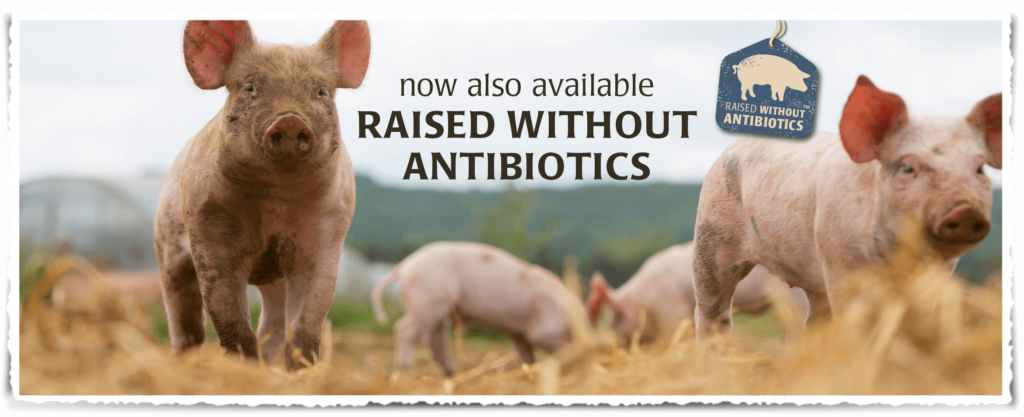A new label on bacon informing consumers pigs have been ‘Raised Without Antibiotics’ has been launched in major retailers across the country.
The label has the backing of the Alliance to Save Our Antibiotics (ASOA) but the National Pig Association (NPA) has urged caution, warning that it ‘must not be used as a gimmick just to sell pork’.
The labels will appear for the first time this month in-store and online on Dry Cured Smoked Back Bacon, Dry Cured Unsmoked Back Bacon and Dry Cured Smoked Streaky Bacon on sale at Morrisons, Tesco, Ocado, Costco, Nisa, Budgens, Spar & Amazon Fresh. It is available from £3.
The pork is marketed by a company called spoiltpig, which has marketed high welfare pork to retailers for a number of years. It comes from RSPCA Assured pigs produced by Brydock Farms, which is owned by Karro.
Under the new system, pigs will be treated for antibiotics when necessary, usually on an individual basis. Any treated pigs will then be sold separately under a Freedom Food label, but will not carry the antibiotic label.
Farming system
spoiltpig said 85-90% of the pigs raised receive no antibiotics. The farming system has been devised to ensure the pigs are not mixed in ages, which it said avoids illness through the benefits of a late weaning period.
Piglets are farrowed outdoors, brought indoors at weaning age and then kept at low stocking densities on deep-straw bedding and with natural ventilation. There is no tail docking or teeth clipping.
Brydock farms said it was working to phase out zinc oxide in anticipation of the forthcoming ban at EU level and had begun trials where the piglets are fed zinc oxide-free diets.
spoiltpig managing director Jim Loescher said: “The launch was born out of spoiltpig’s concern regarding the global issue relating to antibiotic resistance and how farming impacts this.
“We believe in farming responsibly and always strive to do the right thing. That’s why we are launching the UK’s first Raised Without Antibiotics bacon and gammon range – easily identified by our blue Raised Without Antibiotics swing tag.”
ASOA said the initiative shows how major improvements in animal husbandry and welfare can ‘greatly contribute to reducing farm antibiotic use, while still delivering affordable meat’.
“The Alliance to Save Our Antibiotics hopes that the pig industry will learn from the new system which shows that responsible farming can both promote animal health and welfare and help protect the future of antibiotics.”
The alliance stressed, however, that it did not endorse ‘antibiotic-free’ meat labels and production systems, which have seen in the US. It said these can put animal health and welfare at risk when treatment is not provided when it is needed.
ASOA said the term ‘antibiotic-free’ can also mislead the consumer into thinking the main problem with antibiotics in livestock is the residues that end up in food.
NPA response
NPA chief executive Zoe Davies said: “We have always believed this sort of labelling is inevitable in the UK but the key point from our point of view is that it must not be used as a gimmick just to sell a product.
“We are pleased that, in this case, animals can still be treated with antibiotics but we are concerned that consumers will be confused. We need to emphasise that all meat is antibiotic free – we must avoid any impression that by eating meat, consumers will could somehow be exposed to harmful antibiotic residues.”
“There is a very positive story around antibiotic usage in the pig sector. Overall usage is falling year-on-year, including significant reductions in critically important antibiotics, while huge strides have been made in recording antibiotic usage data via the eMB-Pigs database, which will become a Red Tractor scheme requirement this autumn.
“There is a major educational campaign underway and encouraging work to find alternatives to antibiotics is underway. All parts of the industry are working together on this and, collectively, we are up for meeting the challenge of new long-term antibiotic reduction targets, due to be announced this autumn.”




